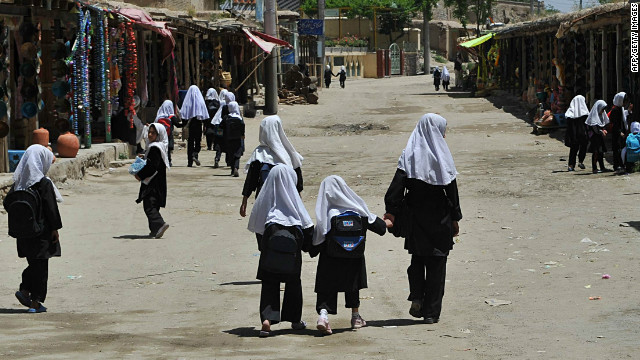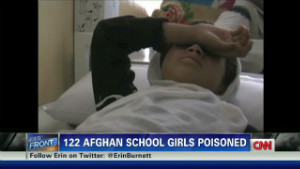Afghan school poisonings an omen?
May 30, 2012 -- Updated 1956 GMT (0356 HKT)

Afghan girls walk to school Tuesday in the village of Istalif, about 30 kilometers north of Kabul.
STORY HIGHLIGHTS
- Gayle Lemmon: Afghan schoolgirls face alleged poison attacks and other threats
- Lemmon: Reports of poisonings vary, but it's certain classrooms across the nation are at risk
- Negotiators must make the safe education of girls a priority for Afghanistan's future, she says
- Lemmon says that Afghan women leaders don't want the world's pity, just its attention
"Instead of increasing
the enrollment of girls in school and establishing more schools,
gradually girls' schools are being closed and shut down," said Selay
Ghaffar, executive director of the Humanitarian Assistance for the Women and Children of Afghanistan.
"Some schools have been put on fire, and we are repeatedly witnessing
that girls' schools have been poisoned. Acid has been thrown on the
faces of girls in Kandahar."

Outer Circle: Afghan girls poisioned
For several weeks,
alleged poisonings have been reported in northern Afghan provinces of
Balkh and Takhar. The latest came Tuesday, when 160 girls from a school
in Takhar province were admitted to a hospital after complaining of
headaches and vomiting. On Sunday, according to Afghanistan's TOLO News,
illness sent 40 female students to seek medical care. So far,
investigators have found no traces of poison, but evidence is still
being examined. The country's deputy education minister told TOLO that
"the enemies of Afghanistan and education are behind such incidents."
Regardless of what is found, what is certain is that threats confront a slew of classrooms across the country.
Although some schools
have reopened since 2009 after the Taliban's revision of its code of
conduct and the reopening of government talks with the Taliban, girls'
schools remain in the crosshairs. The Ministry of Education has said
that as many as 500 schools have been shuttered out of fear of attack
from Taliban or other anti-government forces. But the issue seems to be
as much about political power as ideology and security. And Afghan girls
are not the only ones to pay the price while their education becomes a
political football.

Gayle Tzemach Lemmon
"Education is the
backbone of a country," Ghaffar said. "If half of the population are not
educated and are not part of the economic sector, the education sector,
then how can we manage to have a peaceful, democratic society?"
Taliban leaders have
denied responsibility for sickening the schoolgirls in the north,
maintaining that accusations they are behind the alleged attacks are
"baseless and not true." But local Taliban told The Wall Street Journal
that they stood behind a recent spate of warnings to parents and
teachers in southern Ghazni province to stay away from school.
Said one local Talib to
the Journal: "We aren't against education ... the reason is that
schools, especially girls' schools, are the only tool that attracts
swift government attention."
Certainly one of the
most frequent signs of progress policymakers have pointed to in recent
years is the return of girls to school. From fewer than 5,000 girls who
managed to get educated despite being banned from schools by the
Taliban, an estimated 3 million-plus girls are said to be studying
today. Women now make up a quarter of the Afghan parliament and more
than 3,000 midwives fan out over the country each day to save women's
lives -- in a nation that studies find the world's deadliest for
expectant mothers.
And yet when it comes to Afghanistan's future, women's rights to work and education loom as the boldest question marks.
The Strategic
Partnership Agreement signed by the U.S. and Afghanistan earlier this
month emphasized a "shared determination" to an Afghanistan governed on
values including the "fundamental rights and freedoms of all men and
women." Yet the agreement goes into no specifics about what would happen
if a new Afghan government revoked those same rights and freedoms. And
when this month's NATO summit in Chicago focused on the transition from
international to Afghan responsibility for the country's security
forces, women's rights had no place on the agenda.
"Still the discussion of
women's issues and women's protection within the international system
somehow always seems to be an afterthought, when the bottom line is that
the way women are treated is central to American foreign policy," said
former Secretary of State Madeleine Albright at a "shadow summit" panel
on women's rights hosted by Amnesty International, which I moderated in
Chicago.
"The difficulty is men
-- and the bottom line is that in fact we have to figure out why and to
persuade everybody that having women's rights and women being on various
groups is the best way to ensure a better life for everybody, not just
for women, but for everybody," Albright said.
Afghan women leaders say they are not seeking the world's pity, but its attention.
"I have one message from
Afghan women. 'Don't look at us as victims, we are very active,' " said
Afifa Azim, executive director of the Afghan Women's Network.
"We need all of you to support us by supporting women and human rights
organizations and to put pressure on your policymakers to support the
rights of Afghan women."
Chief among those is the
right to attend school in safety. And only the coming months will tell
whether threats and attacks will keep girls away from classrooms or
whether girls will indeed get the opportunity they seek to contribute to
their own societies.
"Women are the canary in
the coal mine, " Albright said. "It is just a fact that when women are
treated badly in a society, it is a sign of what goes on in the
society."
No comments:
Post a Comment